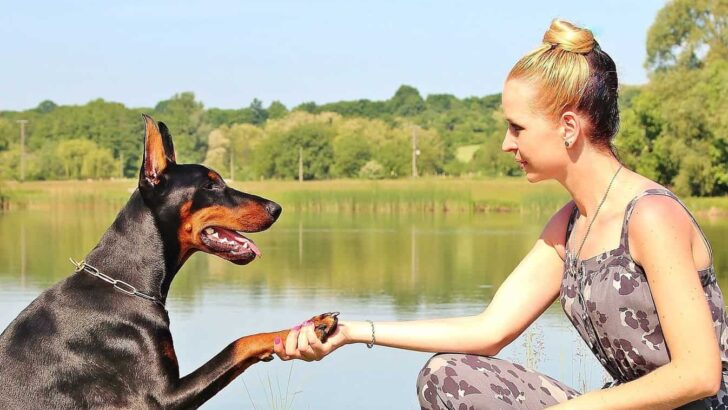- Your Dog Ate Chicken Bones, What To Do? Here Are 5 Important Steps To Follow - July 15, 2022
- How To Stop Dog From Licking Paws – Break The Habit! (Top Causes & Easy Solutions) - February 8, 2022
- 7 Best Fresh Dog Food Delivery Services - December 12, 2019
No matter how much we wish we could bring our dogs with us everywhere we go, one of the challenges any dog parent eventually faces is the need to travel somewhere Fido can’t. Perhaps you’re visiting a family member whose children are allergic to dogs. Perhaps you have to take a business trip somewhere overseas. Perhaps your dog is too large to fly in the cabin of an airplane with you, and you don’t want to relegate him to a place with the baggage.
Whatever the reason, chances are that in the years you share, your dog won’t be able to join you on all your travels. Of course, we all feel no one could care for Fido the way we do, and while that might be true, there are ways to make sure your canine companion gets the best possible care while you are away.
Before Hiring a Dog Sitter
Before hiring a dog sitter, you need to consider various aspects of the decision, including:
- location preference
- your dog’s personality, daily routine, and medications
- communication and transportation
- cost
- references
- character and personality.

Location
There are three basic options regarding possible locations, including your own home, the home of your sitter, or a boarding facility. Each offers advantages and disadvantages, and your particular pooch’s personality and needs can help you decide which option would serve her best.
Home, Sweet Home
Many pet parents opt to keep their pet at home when they are away, having someone either stay full-time at the house, or paying for visits several times a day. One of the advantages of this arrangement is that your dog is already familiar with your home. It’s a comfortable and safe place for your dog, a fact that can help alleviate some of the stress she might feel about your absence. Although she may miss you, she will have her own bed, her own backyard, her own toys–her own familiar, safe space.
Additionally, allowing your pooch to stay put at home can be safer than some other options because your dog knows the space. Second, you know you have already removed any possible dangers; your home is already dog-proof.
However, disadvantages also exist. Getting someone to visit as many times a day or to stay as long as you and Rufus might like can prove difficult. It may be equally difficult to find someone willing to stay at your home for the duration of your trip. If you are fortunate enough to find someone willing to stay at your home with Clifford while you are gone, you may have to pay him or her more, or provide him or her with groceries for the stay. Plus, it can feel like a big favor to ask.
Home Away From Home
If your sitter is a close friend or family member your dog already knows and loves, his or her home may be just as comfortable and familiar to your dog as his own. There are some things to consider, though, before dropping your canine BFF off for a stay with your human BFF. For example, you will want to consider if your dog plays well in the circumstances in which you are leaving him. Are there children? Other dogs? Cats? Is the yard fenced? The answers to these questions can help you decide if a particular friend or family member’s household might be a good fit (or not).
An advantage of this arrangement is that it is likely more accessible for your prospective dog sitter, and so it may prove easier to find someone willing to babysit Barker. If your dog sitter can remain in the comfort of his or her own home with minimal disturbance to his or her routine, he or she is more likely to agree, providing your dog is well-behaved in the home.
Also, if your dog sitter will be staying at his own house, there is no need for you to provide for his basic needs, such as groceries.
There are, however, some downsides to this arrangements. Like inviting someone to visit or stay at your home, asking someone to invite your dog into his or her home can feel like a lot to ask. Plus, you would need to bring all your dog’s necessities–food, toys, leashes, medicine, bowls, treats, etc. Making sure not to forget anything could prove daunting.
Boarding Facilities
If you’re adverse to asking for a favor from a friend, neighbor, or family member; if your dog already regularly attends doggy daycare; or if your dog is easy-going or young, a boarding facility could be a viable option. These facilities offer trained professionals but do come with some risks.
While they save you from asking a big favor, kennels may require vaccinations you don’t want your dog to have, or may require you get more vaccinations than you feel necessary. Furthermore, boarding your furry friend at a facility carries the risk of contagious diseases. Finally, depending on your dog’s disposition, leaving her at a boarding facility may make her anxious and stressed. A list of questions you may want to ask is available here.

Your Particular Pooch
All dogs have their own unique personalities, and what works well for one may not work well for another. Considering your dog’s routine, exercise needs, diet, medications, age, and socialization is crucial to making the right choice when deciding on a dog sitter.
Your Dog’s Routine
If your dog is accustomed to a particular structure or routine, a dog sitter who can devote personalized attention to your dog and adhere to a strict schedule might be your best option. If your dog requires a certain number of walks each day or a walk at a particular time each day, a kennel may not be able to accommodate his particular needs.
If your dog takes meals and medications at specific times during the day, a sitter who is responsible for only him is likely the wisest choice, though boarding facilities can be cognizant of such requirements, as well. If your dog’s routine allows for a little more flexibility, and he is just as happy with unstructured, any-time-goes play in the backyard or plays nicely with others in dog parks, he may do just as well in a kennel for a few days as he would in your own home.
Communication and Transportation
One crucial aspect of dog sitting is communication. When choosing the most appropriate dog sitter for your beloved pet, be sure to ask any potentials about how they plan to reach you in an emergency, with questions, or for any other reason. Do they provide regular updates via e-mail? Do they leave a completed form on the kitchen counter, detailing what time Fido ate, walked, had a potty break, etc.? Do they have a cell phone they can use to text or call you in a pinch? Will they be easily reachable if you need to call or text with updates, questions, advice, etc.? Will they be able to send video and picture updates, if you want them? Do they carry a phone when out with your dog on a walk or at the dog park, in case of emergencies? It is crucial that you set an expectation for communication, and make sure your dog sitter can meet it.
In addition to the ability to remain in touch regarding your dog’s status while you are away, you will want to make sure your dog sitter has reliable transportation to and from your home if he or she will be visiting or staying at your property. You will also want to make sure that, should the necessity arise, your dog sitter would have the capability to safely and promptly transport your dog to the veterinarian.

Cost
Another important consideration to make when choosing the best dog sitter is value for your dollar. Fees will vary depending on your location, as well as your expectations. Be sure to discuss this aspect of the job with your dog sitter before agreeing to any terms, signing any contracts, or leaving town.
References
In addition to asking a potential pet sitter to provide you with references from past clients, you might also consider asking for recommendations from reliable resources, which include your veterinarian, pet-loving friends and neighbors, and even social media. You might even conduct some of your own research on the National Association of Professional Pet Sitters or Pet Sitters International. Ideally, references will attest to a dog sitter’s experience caring for animals, and flexibility and reliability.

Character and Personality
It’s important to make sure a dog sitter’s personality aligns appropriately with your dog’s needs. If your dog is high-energy, she may do best with a dog sitter who is equally active, willing to go for walks, hikes, and runs, or play tug-of-war and fetch in the backyard. If your dog is timid and shy, a calmer, quieter personality may be better suited for the job. Regardless, you are looking for someone who is calm under pressure, reliable and responsible, flexible, and sensitive and responsive to the needs of your particular pet.
You want someone who truly loves animals, and can form or has formed a genuine bond with your dog. For this reason, do not hesitate to invite a dog sitter to your home for a few visits before making a decision, or to take you to visit a potential kennel before committing. Observe how your dog reacts to each person or location to help you decide where and with whom she would be most comfortable and safest. You may also want to consider a potential pet sitter’s answers to these questions when making your final choice. The Humane Society also offers sound advice regarding things you may want to consider in addition to those listed here.
Additional Resources
For more information on this topic, check out the resources below.
Continue reading:
Is It OK To Leave My Dog Alone During The Day?




